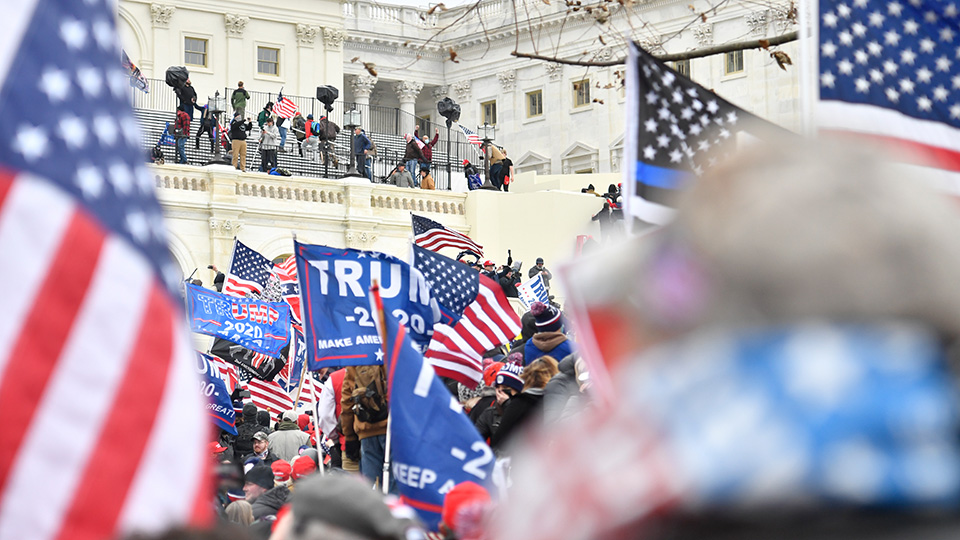One year after a violent mob stormed the U.S. Capitol and disrupted electoral vote proceedings, Northwestern historians and political scientists provide analysis on the national climate and ongoing threats to American democracy.
Northwestern Now spoke with Alvin Tillery, Kevin Boyle, Kate Masur and Michael Allen of the Weinberg College of Arts and Sciences to get their perspectives on what has happened in U.S. politics over the past year, where we stand today and what may come next.
Warning: we are not safe
“Perhaps the most disappointing thing that we have learned is that the American people are largely content to watch their democracy burn,” said political scientist Alvin Tillery, director of Northwestern’s Center for the Study of Diversity and Democracy. “Two years after the largest mass protest movement in American history in the name of #BlackLivesMatter and after watching incredibly brave young people strike out for Democracy in places like Hong Kong and Nigeria, the American people are greeting the continuing assault on our democracy with a resounding ‘meh.’
So, on this eve of the one-year anniversary of the Capitol uprising, my warning to Americans, particularly people of color, is that we are not safe.”
Greater danger in the vote
“In the terror of the moment, it was impossible to see past the violence of last January 6,” said historian Kevin Boyle. “Now the day’s meaning is clearer. The greatest danger to the nation came not in the afternoon’s assault but that evening, when the insurrection had been beaten back, the Capitol secured and Congress reconvened to complete the Constitutional duty the assault had disrupted. In the vote that followed, 147 Republicans refused to certify an election they knew the opposing party had won.
“The truth is no mob is going to topple our democracy. If the system is going to fall, it will be brought down by those men and women powerful enough to destroy it from within, through deception, manipulation and a brutal cynicism they’ll portray as principle. That’s the deep danger that flashed through the Capitol on January 6, a sign of threats to come.”
Fragility of American democracy
“American democracy has been more fragile than many people realize,” said historian Kate Masur. “One of the key tools lawyers have used this year to bring perpetrators of political violence to justice is an 1871 law known as the Ku Klux Klan Act. The law, which targeted the violence committed by the Ku Klux Klan, was intended to protect people’s rights under the 14th and 15th Amendments, which had just been adopted. Now it comes in handy again. This country has been dealing with antidemocratic violence for a very long time.
“You would think Congress could pass legislation to protect Americans’ access to the ballot and secure elections against partisan interference. But Congress is stymied by the filibuster, a Senate tradition regularly used to kill measures designed to make the United States more democratic. Republicans seem to want to return the country to the era before the 1965 Voting Rights Act, and indeed before the Reconstruction amendments, when states had almost total control over elections and voting rights. What happens in the next nine months is likely to be highly significant for the long-term future of American democracy.”
This threat is too serious to ignore
“In the year since January 6, 2021, we have learned that an element of the Republican Party and its base of support is prepared to use violence and threats of violence to seize and hold power in defiance of the democratic majority,” said historian Michael Allen. “That fact has been made apparent less by the mob action that transpired one year ago than by the refusal of leading Republican officials and opinion-makers to condemn that action, to hold its leaders accountable or to act to prevent its recurrence.
“Above all, it has been clarified by the party’s continued allegiance to Donald Trump, who instigated the insurrection and who continues to foment undemocratic forces to the present day. Precisely how large this element is — or how capable it is of realizing its insurrectionist goals — remains uncertain. But if the past year proved anything, it is that this threat is too serious and durable to ignore and must be urgently resisted.”

